Analysis of the quote from Fahrenheit 451
In Fahrenheit 451, the narrator at one point states that at least once in his career, every fireman gets an itch. What do the books say, he wonders. Oh, to scratch that itch, eh? Well, Montag, take my word for it, I've had to read a few in my time, to know what I was about, and the books say nothing! Nothing you can teach or believe. They're about non-existent people, figments of imagination if they're fiction. And if they're non-fiction, it's worse, one professor calling another an idiot, one philosopher screaming down another's gullet. All of them ran about, putting out the stars and extinguishing the sun. You come away lost.'
It is this quote that tells us that by nature a person is curious. Everything that happened to humanity, all the time of its existence, the man was curious about everything that was happening, asked questions, and looked for answers to them. A lot of controversies were due to various studies among scientists who wanted to prove their case. These words try to convince the protagonist, like the whole society of this novel, that there is nothing good in books and new knowledge.
Save your time!
We can take care of your essay
- Proper editing and formatting
- Free revision, title page, and bibliography
- Flexible prices and money-back guarantee
The situation in the novel reminds me of Plato’s Allegory of the cave. People live in ignorance and live only with the knowledge and ideology that is given to them from above. Montag – the main character of Fahrenheit, like the protagonist of the allegory, distinguished himself by not believing in all this false truth. This gives the idea that humanity is not so easy to manage, because there will always be one that asks questions about why and how.
The society described in Ray Bradbury’s dystopia receives information from the screens of TVs, which flooded all the walls of houses, from the noise of radios, and from other distributors of digestible propaganda necessary for the state. But here are books that make you think about everything that happens around people and within society, in this world that are banned. Where they are burned, there is no room for riots and discontent. People who have forgotten how to communicate with each other, are only able to perceive the information they provide, without the need for understanding it. A society that is not able to think is easily governed by the government, which is why under the conditions of a totalitarian regime, literature is prohibited by law, from which it is subject to immediate destruction. This is done so that people continue to consume state propaganda, and do not learn to think and analyze information on their own. Bradbury also creates examples for us of victims of such propaganda, as well as their values, ideals, and views.
In a world where television imposes its opinions and ideals on us, we need to be able to separate the important from the unnecessary, the right from the erroneous and imposed. You need to be able to appreciate and love the world around us, which is much more beautiful and realistic. You need to find time for real communication, which is much more interesting and exciting. We must not forget about books that develop our thinking and imagination.
When you read the lines from Fahrenheit 451, you involuntarily think that we are moving towards the same society and it was precisely on such trends in our society, as the ever-growing role of the simplest sources of information, the alienation of people from each other, the reduction in personal communication between them, and the decreasing number of people reading books every year, and made Bradbury write his anti-utopia.






 Stuck on your essay?
Stuck on your essay?

